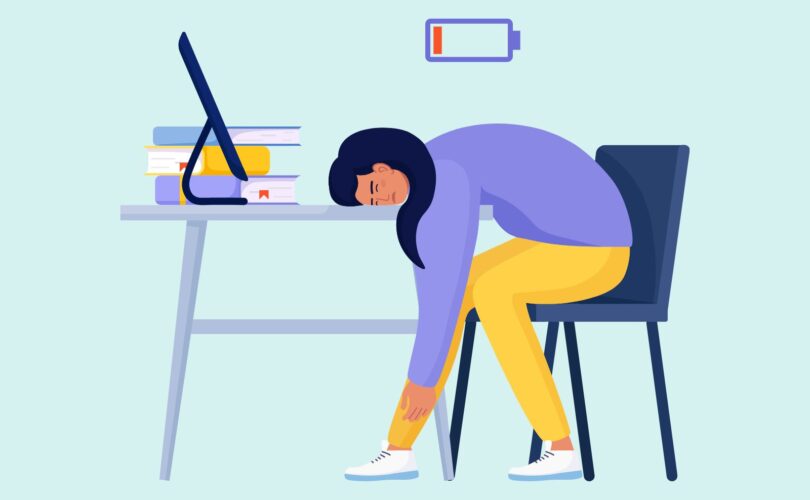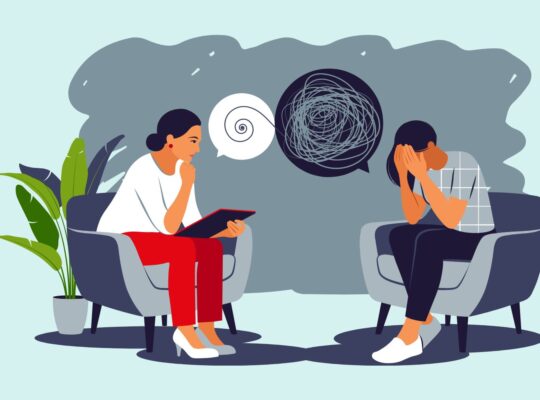Stress. It’s a natural response in our bodies to perceived or even actual threats. For the longest time, it has been an essential piece of our survival. Once in human history, stress told us the situations or perils to avoid. Unfortunately, things have not remained so simple.
In the modern era, stress is a varied and largely unavoidable factor in our day-to-day living. It could be a last-minute report due on your boss’s desk first thing in the morning, a laundry list of tasks to complete on a Saturday, or even just the act of your children being away from home. Left unchecked, stress can leave a sizable impact on our quality of life.
Stress comes in all shapes, forms, and sizes, but it can primarily be organized into two general categories, chronic and acute. We are going to look at the differences that exist and delve deeper into what research has shown us about the effects and even consequences of prolonged stress.
Next, we will look at some of the most common sources of stress and some tips you can use to identify the most common stressors in your own life. This will be the building block you can use to move onto the last and possibly most important step, managing stress.
Once you know the source of your stress, then you can begin to build strategies for coping with these influences. We will look at the benefits that come from managing your stress and some effective tips for doing so.
Chronic Versus Acute Stress
In order to deal with your stress, it’s important to know the kind of stress you’re experiencing, more specifically whether it’s chronic or acute. Acute stress is better understood as a short-term response to a specific stimulus. In some instances, acute stress is seen as primarily positive. This stress often is the driving force behind our growth, whether it be a deadline, a goal weight, or a big relationship decision. While acute stress can be uncomfortable, it can provide plenty of great feedback for our real-time decisions.
On the other end, we have what is called chronic stress. This is the kind of stress that the American Psychological Association (APA) defines as overwhelming or debilitating and marked by persistence over a long extension of time. Many who grapple with chronic stress tend to have pain points in their life which apply unnecessary pressure, destructive even, such as job dissatisfaction or financial strain.
Now, we can see that there are differences between acute and chronic stress. While one may be a tolerable pressure on our short-term experience, the other can be a harmful and an unproductive weight on our life. So how do you tell them apart? It actually may seem trickier than you think it would be.
Of course, many people dislike stress at any level, so determining when intervention is necessary is a valid question. Thankfully, our body can provide us with a lot of information on its own, alerting you when chronic stress is starting to disrupt your well-being.
Your Body On Chronic Stress
Chronic stress is not good for the body, plain and simple. In a published article by the Mayo Clinic titled, “Chronic stress puts your health at risk,” the writers talk a lot about the effects of extended stressors on the body, and our fight or flight response to said stimuli. This response is probably familiar but let us look at it a bit deeper so we can better understand what is happening in our bodies under the influence of chronic stress.
First off, we have to look at the hypothalamus. This is a very small region in our brain that basically acts as an alarm system. When a threat is perceived, the hypothalamus uses nerve and hormone signals in response. This system is used to prompt our adrenal glands (located right by your kidneys) to release a surge of adrenaline and cortisol.
In the presence of adrenaline our heart rate goes up, this in turn raises our blood pressure and increases our energy supply. Then a relatively popular stress hormone known as cortisol acts to increase the glucose in our blood, how well our brain can use the glucose, and even aid in the availability of the stuff we need to fix tissue.
Furthermore, cortisol also dampens functions that are seen as unnecessary or counterproductive in our bodies during these stressful events. It affects our digestive system, reproductive system, growth, and even our immune system. In the end then, this system sets up communication with the essential regions of our brain which control our motivation, fear, and mood.
This is all good and well when done properly. Typically, our brains also work to establish limits, so that our experiences of fight or flight rise and fall as necessary. When we talk about acute stress this is often what we see. But what about when this system isn’t regulated properly?
The Mayo Clinic sums it up well, “The long-term activation of the stress response system and the overexposure to cortisol and other stress hormones that follow can disrupt almost all your body’s processes.”
Thankfully, from this, we can make some observations about the body, specifically the physical signs that we ought to watch out for in regard to chronic stress.
Signs Of Physical Stress
Stress does not stay in your head. As you can see from your fight or flight reaction to external stressors, your mind is playing a big role. When the body is under long-term stress, without the ability to regulate and rest, there are going to be noticeable physical signs.
Here are a few of the big ones from the medical professionals at the Cleveland Clinic you should be mindful of:
- Chest pains
- Racing heart
- Body aches
- Trouble sleeping
- Exhaustion
- Headaches, dizziness, or shaking.
- Stomach or digestive trouble.
- High blood pressure
- Sexual dysfunction
- Weakened Immune System
Loretta Howitt, MD, is a psychiatrist at Kaiser Permanente’s LA Medical Center. In speaking about physical symptoms in her patients without underlying illnesses, Howitt said that “Stress is the underlying problem that needs to be addressed.”
Kaiserpermanente.org lists additional symptoms, such as dry mouth, hair loss, and even muscle aches, among others mentioned before. This is why it is so important to open up about symptoms, however minor, to your primary care doctor. On its own, exhaustion may not seem like much, but in conjunction with other symptoms and with a known stressor, you may be able to better understand what is going on with your body and be better prepared to deal with it, so that you can avoid the consequences of long-term chronic stress.
10 Consequences Of Prolonged Chronic Stress
Chronic stress needs to be taken seriously. One or two nights of poor sleep due to stress about an upcoming presentation might be fine, but what if this becomes a new normal? Do you find stress that was once manageable, beginning to directly affect your health? It’s an important question to ask yourself.
Left unmanaged, chronic stress can have a lasting impact on our well-being, beyond what you may even know to be possible.
10 Consequences Of Prolonged Chronic Stress:
1| Cardiovascular disease: Chronic stress is linked to an increased risk of hypertension, heart attack, and stroke (Mariotti, 2015).
2| Weakened immune system: Elevated cortisol levels can suppress immune function, increasing susceptibility to infections and diseases (Segerstrom & Miller, 2004).
3| Gastrointestinal problems: Stress can contribute to the development of ulcers, irritable bowel syndrome, and other gastrointestinal disorders (Mayer, 2000).
4| Mental health issues: Chronic stress is associated with a higher risk of anxiety, depression, and other mental health disorders (Syed et al., 2017).
5| Sleep disturbances: Stress can cause insomnia or other sleep disorders, leading to reduced cognitive function and overall well-being (Kalmbach et al., 2018).
6| Obesity: Increased cortisol levels can promote fat accumulation, particularly in the abdominal region (van der Valk et al., 2018).
7| Diabetes: Chronic stress can impair glucose metabolism, contributing to the development of type 2 diabetes (Surwit et al., 1992).
8| Premature aging: Chronic stress has been linked to premature aging, as stress hormones can accelerate cellular aging and lead to DNA damage. This is due to the effects of stress on the telomeres, protective caps at the ends of chromosomes. (Lin & Epel, 2022)
9| Cognitive impairment: Chronic stress can lead to cognitive impairment, including memory problems and difficulty concentrating. This is due to the effects of stress on the hippocampus, a brain region important for memory and learning. (Peavy et al., 2009)
10| Reproductive dysfunction: Prolonged stress can lead to reproductive dysfunction, including menstrual irregularities, infertility, and erectile dysfunction. This is because stress hormones can disrupt the normal functioning of the reproductive system. (Bethea, 2008)
As you can see, chronic stress can play a massive role in our mental and physical health. Despite the evidence pointing us to the ever-present harms of stress, it’s become all too common in today’s culture for people to subject themselves to unnecessary strain.
This is why learning the consequences is only the beginning of this journey. Now that you know what’s at stake, it is important to find out where your stress is coming from.
Common Sources Of Stress
As stated in the very beginning, stress can come from almost any area of our life, and while we all may share similar stressors with one another, our experiences can differ vastly from one to the next. Looking at common sources of stress is a great way to start identifying the areas of your life which might be more at risk than others.
Again, this will be different from person to person. Some might find more stress in social situations than in their career, for others it might be the exact opposite. So, to begin, let us look at some of the most common sources of stress:
Work-Related Stressors
Work-related stress is one of the most common stressors, or at least one we most often think of. The American Institute of Stress (AIS) reported that 94% of workers feel stressed at work, with 63% feeling ready to quit, and 57% describing themselves as feeling paralyzed by stress.
Oftentimes, stress at work comes from high demand, long hours, responsibilities, corporate politics, and interprofessional relationships. Work can make up a large portion of our life, so it’s no surprise that it might be one of the leading causes of stress in your life.
Financial Stress
Stressing about money is another common pressure point for people. It could be stress over the income you make, credit card debt, student loan debt, loss of assets, etc. A 2020 survey by the National Endowment for Financial Education found that 88% of Americans reported feeling stressed about money at some point in the previous month. These stressors can lead to feelings of anxiety, helplessness, and uncertainty about the future.
Relationship Stress
Conflicts with partners, friends, and family members cause stress, and are affected by it as well. Relationship problems are vast and varied, from conflicts with partners or family members to concerns about social isolation. According to a 2020 survey by the American Psychological Association, 47% of adults reported feeling significant stress due to relationship problems.
Relationship-related stress can lead to feelings of frustration, sadness, and a sense of loss of connection with others. This can be very difficult to manage on its own, but in conjunction with other stressors, such as work or life transitions, the stress can become compounded. Relationship events, such as divorce or a breakup can deeply impact us, as well as those around us.
Responsibility-Related Stress
Family responsibilities can also be a significant source of stress. Balancing work, family, and other responsibilities can be a significant challenge, particularly for caregivers. In a survey by the American Institute of Stress, 54% of respondents reported feeling stressed by family responsibilities. These stressors can lead to a sense of loss of control over one’s time and priorities.
Health-Related Stress
Health-related stress can also be a significant source of stress, with concerns arising from a variety of reasons, such as chronic illness, injury, or concerns about one’s health or the health of loved ones.
In the Stress in America survey, 40% of respondents reported feeling stressed about their own health, while 35% reported feeling stressed about the health of others. Health-related stress can lead to feelings of fear, worry, and a sense of loss of control over one’s health outcomes. Due to the price of healthcare, health-related stress can often boil over into financial stress in the presence of looming hospital debts, or even into work-related stress as some are forced to put in more hours to alleviate some of the financial burdens.
Environmental Stress
Your environment can influence your stress, as well as how you cope with it. Large cities or areas with heavy congestion can provide enough stimuli to push certain individuals into a strained state. We can also see the reverse of this, as nature and quiet environments can often be largely beneficial to managing stress.
Life Transitions
Life transitions tend to disrupt our routines, and in the process provide a bit of stress as we adapt. Even positive changes, such as buying a dream home, getting married, or entering a new career field can create stress. Other changes which we tend to find less positive can sometimes stretch over weeks, months, or even years, leading to chronic stress.
Traumatic Events
Accidents, natural disasters, and the loss of a loved one are all examples of traumatic events that can cause undue stress in your life. Covid-19 has been one of the most prominent examples of a large-scale traumatic event, one that the AIS survey has found caused many people all over the world a great deal of stress.
Social Stress
Social stress can be experienced in different ways, depending on your natural inclination toward socialization. Social anxiety is a great example of something in that a person could experience a great deal of stress. For others, social stress might look like peer pressure.
Personal Expectations And Perfectionism
Personal expectations and perfectionism are common sources of chronic stress for many people. These tendencies can create a lot of pressure to perform at a high level and can lead to feelings of inadequacy or failure when we fall short of our expectations.
Time Pressure
Time pressure can arise from a variety of sources, such as your work or school deadlines, personal commitments, or unexpected events that disrupt your schedule. It can be particularly challenging when we feel like we don’t have enough time to complete all of the tasks that we need or want to accomplish, leading to consistent stress.
Knowing the common sources of stress can be a great first step in figuring out what might be impacting you most. Perhaps the topic of money has been touchy in your home for the past year or two. You constantly strive to bring in as much income as you can but are still unable to shake that exhausting weight.
Now that you know the general area of concern, you can begin to dig down into the specific paint points that are plaguing you.
15 Tips To Identify Your Sources Of Stress
Not all stressors are a boss screaming at you in a spit-fueled rage. Some are quieter and yet more persistent. Without having a good idea of where a stressor is coming from and how it is affecting us, how can we ever hope to manage the destructive nature of chronic stress? Use these 15 tips to help you identify where your stress might be coming from.
1| Keep a stress journal to track events, situations, or people that trigger stress.
2| Reflect on your emotional responses to various situations.
3| Evaluate your workload and time management skills.
4| Assess your financial situation and identify potential stressors.
5| Examine your relationships and identify any recurring conflicts or communication issues.
6| Review your health history to identify any ongoing health issues that may contribute to stress.
7| Consider the impact of your living environment on your stress levels.
8| Think about any significant life transitions or changes that may be causing stress.
9| Evaluate your social support network and identify any areas of loneliness or exclusion.
10| Reflect on your personal expectations and whether they may be contributing to stress.
11| Consider the role of external pressures, such as societal or cultural expectations.
12| Examine your coping mechanisms and whether they are effective in managing stress.
13| Assess the balance between your work and personal life.
14| Identify any traumatic events or experiences that may be contributing to stress.
15| Seek professional help if necessary, such as counseling or therapy, to identify and address the sources of your stress.
5 Key Benefits Of Managing Stress For Your Health
Hopefully, the consequences we covered before are enough proof that chronic stress is nothing to mess around with. When you know the source of your stress, when you can pinpoint and identify the problem, you enable yourself to at least manage that stress so that there is a limit to the strain. Effectively managing your stress has been shown to provide numerous health benefits, here are some of the big ones:
Reduced risk of chronic diseases: Chronic stress has been linked to an increased risk of various chronic diseases, such as cardiovascular disease, diabetes, and even cancer. By managing your stress, you can lower your risk of developing these conditions. (McEwen, 2017)
Improved immune system: It’s been shown that stress can suppress the immune system, leaving us more susceptible to illnesses. Research also shows us that managing this stress can help regulate our immune system properly, improving overall immune function. (Black et al., 2016)
Better mental health: Chronic stress can lead to anxiety, depression, and other mental health problems in many people. By managing your stress, you can reduce your risk of developing these conditions and improve your mental well-being. (McEwen, 2017)
Increased productivity: Managing chronic stress has been shown to increase productivity and positively affect performance at work or school (Wright & Kirby, 2001).
Improved relationships: Stress can also have negative effects on relationships, leading to conflict and tension. By managing stress, you can improve your communication and reduce relationship problems. (Holt-Lunstad et al., 2015)
The benefits of managing your stress don’t have to end there either. Those may be the big ones but let us also not forget how important it is to enjoy the moments we are in. Stress can often rob us of this joy, leaving us feeling on edge or detached from the very things we work so hard for. Using stress management techniques is a simple way to reclaim the happiness and fulfillment in your life.
15 Effective Stress Management Techniques For Great Physical Health
The light at the end of the tunnel! We’ve talked a lot about the negatives that you may be faced with chronic stress. If you’ve been able to identify with these issues, then take a breath of relief and accept that you’re not alone. Stress is never going to be absolutely avoidable, but there are ways that we can minimize the footprint it leaves on our life.
By using these 15 effective stress management techniques, you can promote the healthy life that you deserve:
Exercise Regularly
Engaging in regular exercise is a great way to reduce the stress hormones that flood your body. Exercise is also a great way of producing natural “feel good” hormones that promote relaxation and joy. Furthermore, engaging in strength training has been shown to increase your mental resilience in the face of stress-inducing circumstances.
Practice Relaxation Techniques
Meditation, deep breathing, stretching, and yoga are all great relaxation techniques that can promote mindfulness. The idea behind mindfulness is to remove yourself from negativity, both external and internal, and place yourself in the present moment, where you can gain a better perspective on your current situation.
Get Good Sleep
Good sleep is marked by quality and consistency. Staying up late night after night is robbing your body of the time and energy it needs to properly process the events of your day. When we are tired, we are far more likely to exist in an inflammatory or agitated physical state, accentuating our problems.
Eat A Balanced Diet
Only ever eating salad is not going to magically eliminate your stress, but eating a balanced diet with nutrient-rich foods can help your mind and body grapple with your mental and physical demands, lowering the chance that energy or nutrient depletion will impact your mood and experience.
Strong Social And Support Circle
A strong social circle can be a powerful tool when handling stress. We aren’t robots, we are not meant to be on our A-game 24/7. Having a shoulder to lean on or cry on when you need it might be the difference in how quickly you can bounce back from a roadblock. Relationships of quality also have a way of feeding our souls and raising our sense of belonging and purpose in the process.
Use Your Time Effectively
Wasted time will feed into stress. Think about it, how many projects or tasks are you leaving for the last minute? Instead of completing something, you’ll spend a longer amount of time thinking about what you have to do, then an aggressively truncated amount of time trying to cram in your efforts. While this may work when necessary, it can be extremely disruptive over a long period of time.
Set Realistic Expectations
Having no goals or unrealistic goals can both be large contributors to stress in our lives. Without goals, we are far more prone to burnout, since it feels like our wheels are spinning continuously without any real measurable sense of success.
With unrealistic goals or expectations, we become critical of our work, never celebrating, or finding the fulfillment our bodies need to move forward without stress.
Take Up A Hobby
Picking up a hobby can often feel like a return to childhood. A hobby is something you’re passionate about, something that brings you joy simply by participating in it. If you already have a list of tasks and a position somewhere, try to avoid turning your hobby into a chore or form of work, as this can sometimes diminish the pleasure and peace, we find in taking it up in the first place.
See A Professional
Sometimes we just need an unbiased person to share our thoughts with, this is where a therapist or psychologist can come into play. Stress has a knack for getting stuck in our heads, especially when chronic. Mental health professionals are trained in the tools and techniques that can aid you in working through the harder points of life.
Set Boundaries
Boundaries are safeguards we put in place to ensure that we protect our time and energy from being taken advantage of. Examples of boundaries may look like the maximum number of hours a week we will stay for overtime at work, what we will share with our friends, or how much of our financial support we will provide others.
Without limits, we can have a tendency to overextend ourselves, producing sore points of stress in our life. Set your boundaries and be sure that others know where your line is to avoid miscommunication.
Focus On The Positive
Sometimes we just need to reframe our situation. Focusing on negative stimuli will always cast a shadow over our experience, robbing us of the good we have. This isn’t to say that just by ignoring negativity all your problems will disappear, but that by choosing to focus on the positive things in our life, we can walk through even the hardest of times with hope and optimism.
Communicate Your Needs And Desires
Communicating your needs and desires is the general idea behind manifestation. It is being honest with others as much as it’s being honest with yourself. Sometimes we have desires we are too afraid to speak, maybe out of embarrassment or fear that these things may never come true. When your life’s direction doesn’t move toward your purpose, you’ll experience stress due to a lack of fulfillment.
Develop Problem-Solving Skills
Effective problem-solving involves a variety of skills, including critical thinking, creativity, communication, and perseverance. When practicing these skills regularly, you can become more confident in your ability to tackle difficult problems.
This will help you save time and find solutions that work for you. By honing your problem-solving skills, you can learn to approach your problems in an effective way, which can ultimately reduce your stress levels.
Limit Stress-Inducing Situations
While it’s impossible to completely eliminate stress from our lives, we can take steps to minimize it by identifying and avoiding situations that trigger our stress response. This is where knowing your stress sources really comes into play. Setting boundaries incorporates a lot into this technique because on occasion you have to learn to say “no.” Be proactive and intentional in your choices and actions.
Embrace Change
Change is almost always daunting at first, but it can also be an amazing opportunity for growth, learning, and positive transformation. People who have a tendency to resist change will also tend to experience greater stress when it’s forced to happen. Let’s be real, life is wild and often unforgiving. The biggest of life changes don’t ask permission when they turn our world upside down. Learning to embrace changes on a smaller scale can teach us to be resilient and adaptable. These attributes will help you manage stress whenever it comes, far better than if you attempt to avoid change at all costs.
Managing stress looks different for everybody, and that’s because we will often face different events and experiences at different times.
These techniques are just tried and true methods to put you back in the driver’s seat. Work at them, one at a time if you have to, and you’ll be far more prepared than ever before to deal with acute and chronic stress in your life.
Final Thoughts
Stress is an inevitable part of life, and while it can serve a beneficial purpose in certain situations, prolonged or unmanaged stress can negatively impact physical health and overall well-being. Acute and chronic stress plays a massive role in our lives, with one being necessary and the other being destructive.
Thankfully, your body provides some very clear physical signs that you can be on the lookout for, to ultimately avoid the major consequences of prolonged stress.
By understanding the difference between acute and chronic stress, recognizing the signs of physical stress, and identifying the sources of stress in your life, you can develop effective stress management techniques to support your health and enhance your quality of life.
Remember that seeking help when needed, whether from friends, family, or professionals, are a crucial component of successful stress management and the journey toward better health.

References:
- Mariotti A. (2015). The effects of chronic stress on health: new insights into the molecular mechanisms of brain-body communication. Future science OA, 1(3), FSO23. https://doi.org/10.4155/fso.15.21
- Segerstrom, S. C., & Miller, G. E. (2004). Psychological stress and the human immune system: a meta-analytic study of 30 years of inquiry. Psychological bulletin, 130(4), 601–630. https://doi.org/10.1037/0033-2909.130.4.601
- Mayer E. A. (2000). The neurobiology of stress and gastrointestinal disease. Gut, 47(6), 861–869. https://doi.org/10.1136/gut.47.6.861
- Syed, S. A., & Nemeroff, C. B. (2017). Early Life Stress, Mood, and Anxiety Disorders. Chronic stress (Thousand Oaks, Calif.), 1, 2470547017694461. https://doi.org/10.1177/2470547017694461
- Kalmbach, D. A., Anderson, J. R., & Drake, C. L. (2018). The impact of stress on sleep: Pathogenic sleep reactivity as a vulnerability to insomnia and circadian disorders. Journal of sleep research, 27(6), e12710. https://doi.org/10.1111/jsr.12710
- van der Valk, E. S., Savas, M., & van Rossum, E. F. C. (2018). Stress and Obesity: Are There More Susceptible Individuals?. Current obesity reports, 7(2), 193–203. https://doi.org/10.1007/s13679-018-0306-y
- Surwit, R. S., Schneider, M. S., & Feinglos, M. N. (1992). Stress and diabetes mellitus. Diabetes care, 15(10), 1413–1422. https://doi.org/10.2337/diacare.15.10.1413
- McEwen, B. S. (2017). Neurobiological and systemic effects of chronic stress. Chronic Stress, 1, 2470547017692328. https://doi.org/10.1177/2470547017692328
- Black, D. S., Slavich, G. M., & Schembri, M. (2016). Mindfulness meditation and the immune system: a systematic review of randomized controlled trials. Annals of the New York Academy of Sciences, 1373(1), 13–24. https://doi.org/10.1111/nyas.12998
- McEwen, B. S. (2017). The neurobiology of stress: from serendipity to clinical relevance. Brain Research, 1675, 3–13. https://doi.org/10.1016/j.brainres.2017.07.010
- Wright, R. A., & Kirby, L. D. (2001). Effort determination of cardiovascular response: An integrative analysis with applications in social psychology. In A. Tesser & N. Schwarz (Eds.), Blackwell handbook of social psychology: Intraindividual processes (pp. 197–227). Blackwell Publishers. https://doi.org/10.1002/9780470998549.ch7
- Holt-Lunstad, J., Smith, T. B., Baker, M., Harris, T., & Stephenson, D. (2015). Loneliness and social isolation as risk factors for mortality: A meta-analytic review. Perspectives on Psychological Science, 10(2), 227–237. https://doi.org/10.1177/1745691614568352
- Lin, J., & Epel, E. (2022). Stress and telomere shortening: Insights from cellular mechanisms. Ageing research reviews, 73, 101507. https://doi.org/10.1016/j.arr.2021.101507
- Peavy, G. M., Salmon, D. P., Jacobson, M. W., Hervey, A., Gamst, A. C., Wolfson, T., Patterson, T. L., Goldman, S., Mills, P. J., Khandrika, S., & Galasko, D. (2009). Effects of chronic stress on memory decline in cognitively normal and mildly impaired older adults. The American journal of psychiatry, 166(12), 1384–1391. https://doi.org/10.1176/appi.ajp.2009.09040461
- Bethea, C. L., Centeno, M. L., & Cameron, J. L. (2008). Neurobiology of stress-induced reproductive dysfunction in female macaques. Molecular neurobiology, 38(3), 199–230. https://doi.org/10.1007/s12035-008-8042-z







